

Mirrors Windows and Sliding Glass Doors. Ten ways teacher librarians improve literacy in schools. Australian schools constantly strive to improve the literacy outcomes of their students. Supporting literacy achievement for struggling readers is particularly important because these readers have their disadvantage compounded: capable students develop “richer” skills through continued exposure to reading, and the gap between them and struggling readers widens.
Breaking From Tradition To Create A Culture Of Reading – The Teacher And The Admin. Last June, I had the good fortune to address the senior members of our school’s National Honor Society.
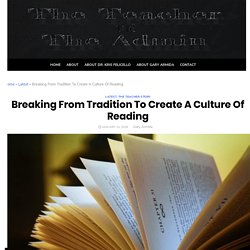
It was their senior breakfast, one of the last official school events before they would be graduating and moving on. As I looked out from the podium, it hit me. Four years prior, I was literally the first teacher that 30 of them had in high school. They were the last group that I had taught as freshmen before I had moved on to teach other courses, which, for some of them, forced them to have me for another year or two.
School Library Journal. At the St.
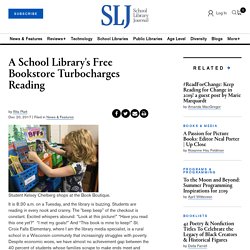
Croix Elementary School in rural Wisconsin, students earn Book Bucks by meeting academic goals and spend them on gently used items. Student Kelsey Chelberg shops at the Book Boutique. It is 8:30 a.m. on a Tuesday, and the library is buzzing. Students are reading in every nook and cranny. The "beep beep" of the checkout is constant. The secret to our success. Statistics About Struggling Readers and Reading Growth. Can reading practice help transform struggling readers into successful readers?
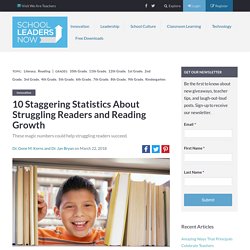
And by doing so, can we change the trajectory of their long-term educational careers—perhaps even influence their odds of graduating from high school and attending college? The following ten statistics about struggling readers and reading growth, originally included in a recent article series by Renaissance, show how even a small increase in daily reading practice could make a huge difference for all students. Reading Practice by the Numbers: 1. 6 More Minutes Results from the world’s largest annual study of K–12 student reading habits found that students who started the year as struggling readers but ended the year at or above benchmark each day read just six more minutes than struggling readers who did not meet benchmark.
Source: Renaissance 2. 15 Minutes Per Day. How to Stop Killing the Love of Reading. How I Made In-Class Silent Reading Work for Me. My second year of teaching, all the English teachers on our campus were given daily 90-minute blocks instead of 45, so I started an in-class silent reading procedure.
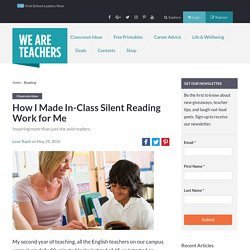
However, I did it all wrong. My students, 99 percent of whom were not avid readers, were not simply going to sit and read for 10 to 15 minutes without a fight. So, they hid phones behind their books. They read the same two pages over and over again. They picked up a different book every day because it got too hard after the first few chapters. Listening Isn’t Cheating: How Audio Books Can Help Us Learn.
The Problem with Reading Levels - Intellectual Freedom Blog. How Audiobooks Can Help Kids Who Struggle with Reading. Audiobooks and podcasts are popular ways of bringing stories to students, and each mode brings something unique to the class. William Weil, who with his wife founded the audiobook steaming service for schools, Tales2Go, said that even kids surrounded by articulate adults benefit from hearing the complex words and sentences found in novels and nonfiction; correct usage is often lacking in ordinary conversation.
Further, audiobooks come with “transcripts”—the book itself—which help support literacy. Finally, advances in digital technology allow teachers to bring audiobooks to the classroom without depending on dated cassettes or CDs: the site Tales2Go allows teachers and schools to buy instant, simultaneous, and unlimited access to audiobooks, letting students listen to stories on multiple devices. 7 Ways Audiobooks Benefit Students Who Struggle with Reading. When students in grades 3–8 have reading skills that are below benchmark, they lose ground more rapidly.
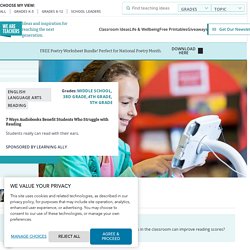
As they move up in school, reading becomes all about learning new information and content. 7 Ways to Get Your Struggling Readers to READ. “Before I knew I was dyslexic, I thought I was stupid,” said the boy who graduated high school with honors and is headed to Yale in the fall.
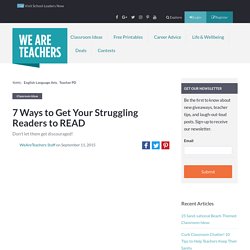
The truth is, many kids who struggle with reading initially believe they’re stupid. Graphic novels zap literacy — and fun — into curriculum. Graphic Novels foster literacy. Comics exploded in America during the 1940s.

This is referred to as the Golden Age in comics when everything was about heroes and superheroes. The now iconic Batman and Superman lead the way in popularity. It was an exciting time in American culture. Want to help your child succeed in school? It’s about reading, not homework. What parent doesn’t want their kid to thrive at school?
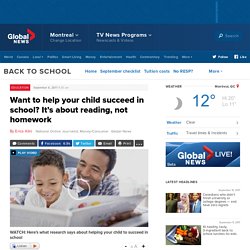
Most of us would do anything to help our little ones hit academic and developmental goals. It turns out, doing so might be easier than you think. The most effective way to help our children succeed has little to do with baking pies for school fundraisers or rushing to school meetings. Neil Gaiman: Why our future depends on libraries, reading and daydreaming. It’s important for people to tell you what side they are on and why, and whether they might be biased.

A declaration of members’ interests, of a sort. When Adults Don't Read, Kids Lose. Note: This post was co-written with my friend Todd Nesloney, who is both the principal at Webb Elementary School in Navasota, TX and the coauthor of the book Kids Deserve It.
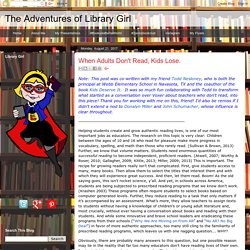
It was so much fun collaborating with Todd to transform what started as a conversation over Voxer about teachers who don't read, into this piece! Thank you for working with me on this, friend! I'd also be remiss if I didn't extend a nod to Donalyn Miller and John Schumacher, whose influence is clear throughout. Helping students create and grow authentic reading lives, is one of our most important jobs as educators. Strategies to Help Students ‘Go Deep’ When Reading Digitally. Students are doing more reading on digital devices than they ever have before. Not only are many teachers using tablets and computers for classroom instruction, but many state tests are now administered on computers, adding incentive for teachers to teach digital reading strategies.
Science Has Great News for People Who Read Actual Books. It's no secret that reading is good for you. Just six minutes of reading is enough to reduce stress by 68%, and numerous studies have shown that reading keeps your brain functioning effectively as you age. One study even found that elderly individuals who read regularly are 2.5 times less likely to develop Alzheimer's than their peers.
But not all forms of reading are created equal. The debate between paper books and e-readers has been vicious since the first Kindle came out in 2007. Most arguments have been about the sentimental versus the practical, between people who prefer how paper pages feel in their hands and people who argue for the practicality of e-readers. Comics and Reluctant Learners: Dispelling the Myths. By Michael Gianfrancesco I have been doing this whole “teaching with comics” thing for nearly 15 years and I am fortunate enough to have the opportunity to work with teachers all over the country.
The Ways Librarians Inspire a Love of Books in Reluctant Readers. There’s a well-known quote by Frank Serafini that goes, “There is no such thing as a child who hates to read; there are only children who have not found the right book.” And yet, as a concerned parent, grandparent, or caregiver, how do you ensure that the “right book” gets into the hands of your reluctant reader? The Scientific Reason Actual Books Are So Much More Memorable Than E-Books.
5 Minute Librarian: 7 Ways to Rediscover Your Love for Reading. The worst has happened. In Defense of Free Choice Independent Reading. Reversing Readicide. Google Docs - create and edit documents online, for free. Ten ways to Ditch that Reading Log - Middle School Minds. Ten ways to Ditch that Reading Log - Middle School Minds. The Reading Brain in the Digital Age: The Science of Paper versus Screens. In a viral YouTube video from October 2011 a one-year-old girl sweeps her fingers across an iPad's touchscreen, shuffling groups of icons. In the following scenes she appears to pinch, swipe and prod the pages of paper magazines as though they too were screens. When nothing happens, she pushes against her leg, confirming that her finger works just fine—or so a title card would have us believe. The girl's father, Jean-Louis Constanza, presents "A Magazine Is an iPad That Does Not Work" as naturalistic observation—a Jane Goodall among the chimps moment—that reveals a generational transition.
Why teenagers are so resistant to e-readers. There seems to be an idea spouted by many working in the media at the moment, that young people are giving up on traditional media. The BBC took BBC Three off our TV screens recently as it moves online to further target that lucrative 16-24 demographic. The BBC Trust claimed that there was “clear public value in moving BBC Three online, as independent evidence shows younger audiences are watching more online and watching less linear TV”.
As made evident by their Twitter feed, many in the country have been left slightly confused by this move. Benefits of Reading Infographic. A Curriculum Staple: Reading Aloud to Teens. Dana Johansen, a teacher at the Greenwich (CT) Academy, reads to eighth graders.Photo courtesy of Greenwich Academy. Every year, Beth Aviv, a high school English teacher in Westchester County, NY, asks her students, “How many of you were read to by a parent when you were little?”
Last year, only a quarter of the class raised their hands. I Am Not My Disability: Outstanding Books For and About Young People with Disabilities - National Reading Campaign National Reading Campaign. Every two years, the International Board on Books for Young People (IBBY) chooses outstanding books for and about young people with disabilities. This biennial selection draws attention to books published around the world that address special needs and situations and which encourage inclusion at every level. Outstanding titles, including the one below, become part of The IBBY Collection of Books for Young People with Disabilities. This one-of-a-kind collection is located in Canada at North York Central Library, part of the Toronto Public Library system. Why kids still need ‘real books’ to read — and time in school to enjoy them. Nancie Atwell is the renowned founder of the Center for Teaching and Learning, an award-winning non-profit independent K-8 demonstration school in Edgecomb, Maine, where she teaches seventh- and eighth-grade writing, reading and history.
She is the author of numerous books, including the classic “In the Middle: A Lifetime of Learning About Writing, Reading, and Adolescents,” which has inspired teachers for years, and she has won numerous awards, including the first-ever $1 million Global Teacher Prize given earlier this year by the Varkey Foundation. 10 Reasons Nonreaders Don't Read — And How to Change Their Minds.